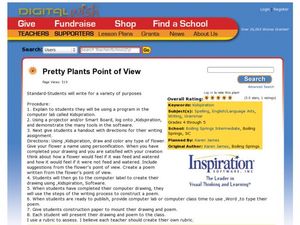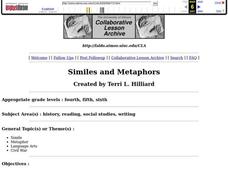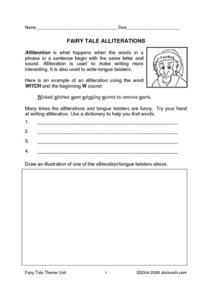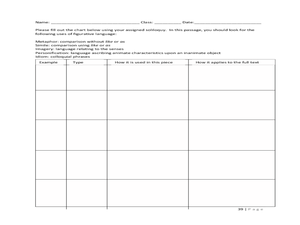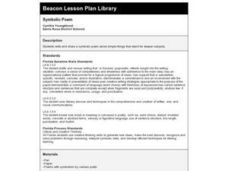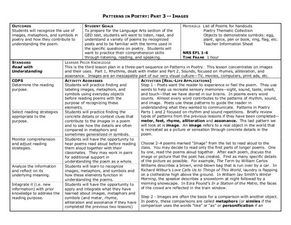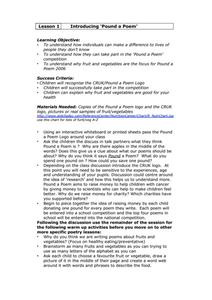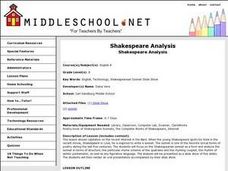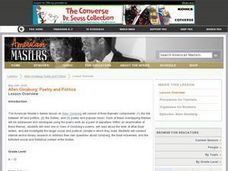Curated OER
Similes and Metaphors: An Interactive Review
Get your pupils' attention with this lesson on similes and metaphors, which features two poems by Tupac Shakur. A SMART board presentation guides them through the lesson, which includes a BrainPop activity (linked). After they have...
Curated OER
Pretty Plants Point of View
Young poets use Kidspiration to draw a flower, personify the flower, and write a poem from the flower's point of view. Sharing these poems in small groups will reinforce learners' knowledge of personification.
Curated OER
Similes and Metaphors
Use the Civil War and important figures from that period to help your class write poetry. You'll need to create a list of similes and metaphors, but you could also consider having your learners create this the day prior. They will use...
Curated OER
Similes and Metaphors
Pupils examine poetry to identify the use of metaphors and similes after the teacher defines what they are. They decide how they can use similes and metaphors to describe different pieces of fruit. Finally, they write poetry about the...
Curated OER
Personification #2
Langston Hughes’ poem, Fall Leaves, provides the text for a personification identification worksheet. Pupils underline examples of this literary device and then write an explanation of how it is used in the poem.
Curated OER
Fairy Tale Alliterations
Fairy tales are the perfect way to focus on alliteration. Learners complete activities relating to alliteration and similes using a fairy tale theme. Then, they complete an acrostic poem using the words fairy tale.
Curated OER
Language Arts: Stylistic Devices
Students are able to define given literary terms, such as metaphor, simile, imagery, personification, symbolism, etc. They are able to identify the use of literary elements in a given text. Students are able to interpret weather...
Curated OER
Headless Horseman, Heady Author
Twelfth graders explore figurative language as it appears in Washington Irving's original text, The Legend of Sleepy Hollow, answer questions based on story, and write sequels to it by using the different types of figurative language...
Curated OER
Soliloquy Performances
Learners investigate soliloquies. In this performing arts lesson, students discuss figurative language within soliloquies and then perform a soliloquy to the rest of the class.
Curated OER
Poetic Elements
Poetry is all about sound and rhythm. The sound of the words, the rhythm of the lines, and the emotional atmosphere created by these elements and the literary devices poets use, compress whole stories into a few stanzas. The specialized...
Curated OER
Louisiana's Tragic Hero - "Evangeline"
"Ye who believe...List to a Tale of Love in Acadie." Longfellow's epic poem, "Evangeline," launches a study of tragic heroines, epic poetry, the expulsion of the Acadians from Canada, and their subsequent migration to Louisiana. The...
Reed Novel Studies
Winnie-The-Pooh: Novel Study
Winnie the Pooh lands in a gorse-bush plant in chapter one of A.A. Milne's beloved children's novel, Winnie-the-Pooh. With the novel study, scholars research three interesting facts about the plant. They also compose a four-line poem...
Curated OER
Sound Devices in Poetry, Fiction and Nonfiction
Students examine the impact of sound devices in poetry. In this poetry lesson, students read the listed poems and identify uses of alliteration, repetition, consonance, rhythm, rhyme, and slang. Students discuss how sound devices enhance...
Curated OER
Symbolic Poem
High schoolers read and analyze several highly symbolic poems. They create their own symbolic poem, read it to the class, and discuss whether they can guess any hidden meanings.
Curated OER
Introduction to Poetry
Students determine the rhyme scheme of a poem and find examples of similes. In this poetry analysis lesson, students review definitions needed for the topic and analyze the rhyme or rhythm for the example poems. Students also find...
Curated OER
Personification Lesson Plans and Resources
This resource on personification provides three different approaches aimed at different levels. The first, appropriate for upper elementary, provides examples of personification, followed by an exercise that requires replacing a word in...
Curated OER
"How to Eat a Poem"
Eighth graders write a poem showing what they know about metaphors, and non-literal language to express ideas, convey meaning, and create images after they read Eve Merriam's "How to Eat a Poem".
Curated OER
Forms of Poetry
Pupils identify distinguishing features of poetry. They identify and use literary terminology including symbol, theme, simile, and alliteration. They recognize the effects of language.
Curated OER
Patterns In Poetry: Images (Part 3)
Students explore imagery in poetry. For this poetry lesson, students examine how the use of metaphors and similes aid in reading comprehension. Multiple resources are provided.
Curated OER
Pound A Poem
Students participate in various poem-related lessons to learn how they can make a difference in the lives of people they don't know. In this poetry instructional activity, students discover that this pound a poem competition is about...
Curated OER
Language Arts: Creative Writing Devices
Eighth graders review sound and rhythm devices and apply them to their own writing exercises. Next, they interpret the poem, "Where I'm From," as an example of a personal narrative. Using their understanding of poetic devices, they...
Curated OER
American Rhythms
Students combine elements of music with poetry. In this creative writing instructional activity, students examine poems from a variety of authors with varying writing styles. Students explore the different elements of poetry, including...
Curated OER
Shakespeare Analysis
Eighth graders focus on the Shakespearian sonnet as a form and analyze the sonnet in terms of structure, the particular rhyme scheme of the quatrains and the rhyming couplet, the rhythm of iambic pentameter, as well as any figurative...
Curated OER
Allen Ginsberg: Poetry and Politics
Students explore the poetry of Allen Ginsberg. They read and analyze poems by Allen Ginsberg, conduct Internet research, collect examples of art of the 60s, and create a presentation.



